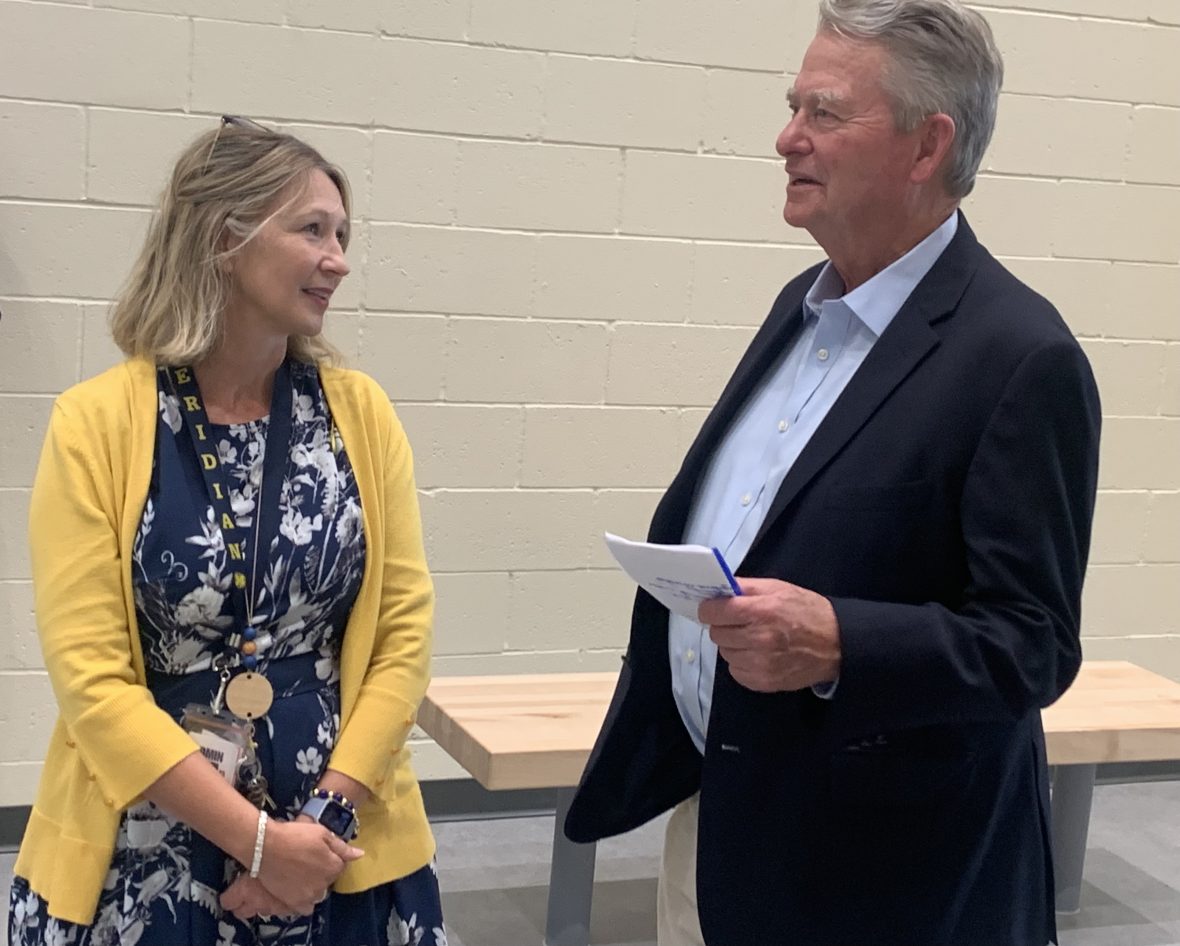
Gov. Brad Little hit back-to-school night at Meridian High School Tuesday, pitching Idaho Launch to parents and seniors.
Meridian High principal Jill Lilienkamp was listening as well. Afterwards, she said she has a lot to learn about the brand-new incentive program for high school graduates.
“To be honest, tonight was the first we heard about it,” she said.
Educators have a lot to figure out. The same goes for state officials. Because, ready or not, the much-ballyhooed Launch program is supposed to get off the ground in barely a month.
On Oct. 3, seniors can begin applying for Launch grants — which will cover up to $8,000 for community college, a career-technical program or workforce training.
Students won’t get their share of the $80 million in grants until July 1 — and not until they graduate from high school.
Before any of that happens, the state’s Workforce Development Council has its own senior project of sorts. And it’s a big one: Starting an ambitious statewide program in real time, working through a maze of process and a morass of questions.
One big piece is what Workforce Development Council officials call the “playbook.” This is the how-to guide for administrators like Lilienkamp, and teachers and counselors across the state, so they can help seniors navigate the application process. The playbook is in the works. Educators may be enthusiastic — “They’re just excited to have another route to help students,” said Sherawn Reberry, a former district superintendent now working as the council’s Launch manager — but she knows they also need more information from the state.
The council also needs to define what is, and isn’t, an in-demand career, which sounds deathly dull until you consider the Launch debate so far. The grants are designed to support students who want to pursue a hard-to-fill job. From the start, many lawmakers bristled at the idea that a state agency would define an in-demand career — picking winners and losers, as the argument goes.
The full council will meet next month to work on this list, and last week, a council subcommittee recommended focusing on jobs with 50 or more openings per year. But that doesn’t cover it.
According to federal labor statistics, the hottest job in Idaho is retail sales, with more than 3,700 openings a year. The runners-up, fast-food jobs and cashiers’ positions, account for more than 3,100 openings apiece. But these jobs don’t require training. The in-demand careers list is going to incorporate hot jobs that require a two-year degree or some kind of job training.
Then there’s the question of extensions — and whether students should have more than three years to spend their grants. A council subcommittee spent considerable time last week working through some what-ifs. A student on a waiting list for a hard-to-find training program will get an extension. A doctor’s note will probably suffice for a medical exemption. A gap year is probably out of the question.
And when the Workforce Development Council works through all of the rampup issues, then comes the unknown that council executive director Wendi Secrist is worried about the most. When July 1 rolls around, the state needs to get grant money out the door so Launch recipients can get into training.
This too sounds like wonky stuff — but it’s also where the program directly affects the people it’s supposed to help. Secrist says she’ll feel a lot more comfortable when the state has a grant management program in place. “I just want us set up for success at the beginning.”
But first things first. Is Launch going to be a hit with Idaho high school grads?
After barely getting his pet program through a deeply divided Legislature, Little isn’t leaving anything to chance. While he was talking up the program at West Ada’s Meridian and Owyhee high schools, Lt. Gov. Scott Bedke was out Tuesday night doing the same thing at Rocky Mountain and Eagle high schools.
At Meridian High, Little preached a little patience; he said it will take time for community colleges and workforce training programs to scale up Launch-supported training programs. Little also conveyed a sense of urgency — to this year’s seniors, and to underclassmen — and said his program will change the lives of young people who aren’t college-bound.
“I want you to choose to stay in Idaho,” he said. “That requires a greater level of skill than before.”
While Lilienkamp has questions about Launch, she also is quick to see its potential.
Meridian is the career-technical education magnet school for West Ada, Idaho’s largest school district. About 500 to 600 CTE students take classes at Meridian — provided that they get through a waiting list or win a lottery for a spot in a popular class.
Many of these CTE students go straight into the workforce. But Launch might give them new options; now, they can build on a CTE certificate by adding an associate’s degree. “We’ll be pushing it a lot,” Lilienkamp said.
To hear Bedke talk, Launch will likely sell itself, with little pushing.
“This is $8,000,” he told council members last week. “This is going to get real legs out there.”
Recent history is on Bedke’s side. Advanced Opportunities — which bankrolls dual-credit courses and other college- and career-oriented K-12 programs — was a runaway hit from Day One. So was Little’s education microgrant program, now known as Empowering Parents.
Breaking news: People like money.
Which makes the fast-track rollout of Idaho Launch that much more crucial — and, maybe, that much more challenging.
Kevin Richert writes a weekly analysis on education policy and education politics. Look for his stories each Thursday. Due to the timeliness of the topic, this week’s analysis was published on Wednesday, Aug. 30.
